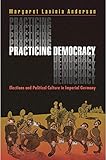Practicing Democracy : Elections and Political Culture in Imperial Germany / Margaret Lavinia Anderson.
Material type: TextPublisher: Princeton, NJ : Princeton University Press, [2022]Copyright date: ©2000Description: 1 online resource (488 p.) : 13 halftonesContent type:
TextPublisher: Princeton, NJ : Princeton University Press, [2022]Copyright date: ©2000Description: 1 online resource (488 p.) : 13 halftonesContent type: - 9780691229539
- Authoritarianism -- Germany -- History -- 19th century
- Democracy -- Germany -- History -- 19th century
- Elections -- Germany -- History -- 19th century
- Elections -- Germany -- History -- 20th century
- HISTORY / Europe / Germany
- Activism
- Alsace-Lorraine
- Amendment
- Antisemitism
- Backwardness
- Ballot box
- Ballot
- Bribery
- Bureaucrat
- By-election
- Calculation
- Chairman
- Civil service
- Class conflict
- Clergy
- Comrade
- Conservative Party (UK)
- Criticism
- Deliberation
- Democracy
- Democratization
- East Prussia
- Election commission
- Election law
- Election
- Electoral district
- Electoral fraud
- Embarrassment
- Employment
- Federal republic
- Fraud
- Friedrich Naumann
- Germans
- Gerrymandering
- Hostility
- Ideology
- Imperial Government
- Imperial election
- Incumbent
- Injunction
- Institution
- Intimidation
- Journeyman
- Kulturkampf
- Laborer
- Landtag
- Legislation
- Legislator
- Legislature
- Local government
- Loyalty
- Mittelstand
- Multi-party system
- Newspaper
- Ostracism
- Otto von Bismarck
- Party system
- Political Catholicism
- Political campaign
- Political culture
- Political party
- Political science
- Political spectrum
- Politician
- Politics
- Polling place
- Poor relief
- Precinct
- Prerogative
- Proclamation
- Proportional representation
- Protest
- Protestantism
- Provision (contracting)
- Prussia
- Public administration
- Radicalism (historical)
- Regime
- Requirement
- Resignation
- Robert von Puttkamer
- Secret ballot
- Simplicissimus
- Skepticism
- Social democracy
- Socialist law
- Society of Jesus
- Suffrage
- Supporter
- Tariff
- Tax
- The Other Hand
- Trade union
- Uncertainty
- Universal suffrage
- Upper Silesia
- Voting
- Weimar Republic
- West Prussia
- Workplace
- 324.7/0943/09034 21
- JN3838
- JN3838 .A54 2000
- online - DeGruyter
| Item type | Current library | Call number | URL | Status | Notes | Barcode | |
|---|---|---|---|---|---|---|---|
 eBook
eBook
|
Biblioteca "Angelicum" Pont. Univ. S.Tommaso d'Aquino Nuvola online | online - DeGruyter (Browse shelf(Opens below)) | Online access | Not for loan (Accesso limitato) | Accesso per gli utenti autorizzati / Access for authorized users | (dgr)9780691229539 |
Frontmatter -- CONTENTS -- LIST OF FIGURES -- ACKNOWLEDGMENTS -- A NOTE ON USAGE -- ABBREVIATIONS -- PART ONE The Framework -- CHAPTER ONE Introduction -- CHAPTER TWO The Morphology of Election Misconduct: International Comparisons -- CHAPTER THREE Open Secrets -- PART TWO Fields of Force -- CHAPTER FOUR Black Magic I: The First Mobilization -- CHAPTER FIVE Black Magic II: Keeping the Faith -- CHAPTER SIX Bread Lords I: Junkers -- CHAPTER SEVEN Bread Lords II: Masters and Industrialists -- PART THREE Degrees of Freedom -- CHAPTER EIGHT Disabling Authority -- CHAPTER NINE Going by the Rules -- CHAPTER TEN Belonging -- CHAPTER ELEVEN Organizing -- CHAPTER TWELVE. Conclusions -- BIBLIOGRAPHY -- INDEX
restricted access online access with authorization star
http://purl.org/coar/access_right/c_16ec
What happens when manhood suffrage, a radically egalitarian institution, gets introduced into a deeply hierarchical society? In her sweeping history of Imperial Germany's electoral culture, Anderson shows how the sudden opportunity to "practice" democracy in 1867 opened up a free space in the land of Kaisers, generals, and Junkers. Originally designed to make voters susceptible to manipulation by the authorities, the suffrage's unintended consequence was to enmesh its participants in ever more democratic procedures and practices. The result was the growth of an increasingly democratic culture in the decades before 1914. Explicit comparisons with Britain, France, and America give us a vivid picture of the coercive pressures--from employers, clergy, and communities--that German voters faced, but also of the legalistic culture that shielded them from the fraud, bribery, and violence so characteristic of other early "franchise regimes." We emerge with a new sense that Germans were in no way less modern in the practice of democratic politics. Anderson, in fact, argues convincingly against the widely accepted notion that it was pre-war Germany's lack of democratic values and experience that ultimately led to Weimar's failure and the Third Reich. Practicing Democracy is a surprising reinterpretation of nineteenth- and early twentieth-century Germany and will engage historians concerned with the question of Germany's "special path" to modernity; sociologists interested in obedience, popular mobilization, and civil society; political scientists debating the relative role of institutions versus culture in the transition to democracy. By showing how political activity shaped and was shaped by the experiences of ordinary men and women, it conveys the excitement of democratic politics.
Mode of access: Internet via World Wide Web.
In English.
Description based on online resource; title from PDF title page (publisher's Web site, viewed 29. Jul 2022)


